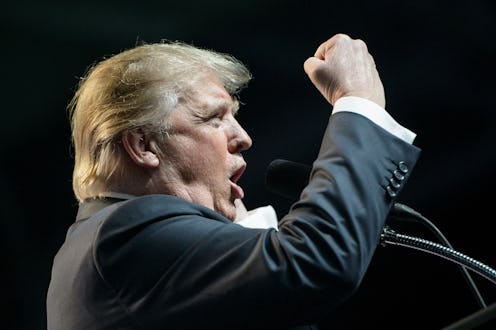News
What Purvi Patel Reveals About Trump's Views
Purvi Patel was convicted of feticide and neglect of a dependent last year for ending her own pregnancy, and the Indiana woman's attorneys had a hearing in front of the Indiana Court of Appeals on Monday in an attempt to overrule the controversial conviction. The first woman in the U.S. to be sent to prison for feticide for having an illegal abortion, Patel was sentenced to 20 years behind bars. Although parts of the story remain unclear, Patel's case reveals a problem with Donald Trump's stance that people should be punished for performing abortions.
Back in March, the presumptive GOP presidential nominee told MSNBC's Chris Matthews that "there has to be some form of punishment" for women who have abortions. After intense backlash, he backtracked to say that doctors, or anyone else providing an abortion, are the ones who should be punished, and not the women themselves. In a statement on his website, he said: "The woman is a victim in this case as is the life in her womb." He tried to further clarify his stance in an interview with The New York Times Magazine's Robert Draper last week, saying women "punish themselves," and that he didn't mean they should be put in prison.
However, Patel's case highlights how the woman and the provider can be the same person.
The 34-year-old was accused of buying medication online to induce an illegal abortion and neglecting a premature baby that could have lived. The state alleged that Patel gave birth to a live baby, despite her consistent claims that she delivered a stillborn child, which constituted the additional charge of neglect. A 2009 Indiana law established stricter punishment for the death of a fetus as a result of the murder of a pregnant woman, and prosecutors argued that it allowed them to charge Patel for feticide.
Regardless of the unresolved question about whether Patel delivered a living or stillborn child, her conviction proves that seeking to punish abortion providers leads to punishing women. Whenever and wherever abortion becomes illegal or difficult to access, women will try to end their pregnancies on their own out of desperation. "Women will self-induce if that is their only option, despite the fact that it puts their health at risk — and in many cases, their liberty, as well," a 2015 Guttmacher report explained. After Texas passed the restrictive HB2 abortion law in 2013, between 100,000 and 240,000 women in the state between the ages of 18 and 49 attempted to self-induce abortions, according to a report by the Texas Policy Evaluation Project (TxPEP).
Given that some women with no other solutions will end their own pregnancies, Trump's claim that he would punish abortion providers, not women seeking abortions, isn't any better for women than his initial statement which implied women would go to prison. When you end your own pregnancy, you become both the patient and the provider, so if performing an abortion is a crime, women will absolutely end up behind bars.
This is an important distinction to make, because Trump and others who tout similar views play off punishing abortion providers as a totally different thing than punishing women. But they're one in the same. Limiting abortion access in any way punishes women, but it specifically forces them into situations where they feel the need to self-induce abortions, which a Trump administration would seek to punish them for.
It's impossible to punish abortion providers without punishing women as well. Trump may say he doesn't want to put women in prison for ending a pregnancy, but that's exactly what his plan would do.
